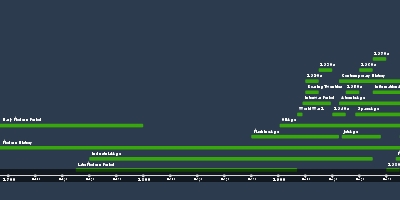Modern History (jan 1, 1500 – 12h 18min, oct 29, 2025 y)
Description:
In the linear, global, historiographical approach, modern history (the "modern period," the "modern era," "modern times") is the history of the period following post-classical history (in Europe known as the "Middle Ages"), spanning from about 1500 to the present. "Contemporary history" includes events from around 1945 to the present. (The definitions of both terms, "modern history" and "contemporary history", have changed over time, as more history has occurred, and so have their start dates.) Modern history can be further broken down into periods:The early modern period began around 1500 and ended around 1815. Notable historical milestones included the continued European Renaissance (whose start is dated variously between 1200 and 1401), the Age of Exploration, the Islamic gunpowder empires, the Protestant Reformation, and the American Revolution. With the Scientific Revolution, new information about the world was discovered via empirical observation and the scientific method, by contrast with the earlier emphasis on reason and "innate knowledge". The Scientific Revolution received impetus from Johannes Gutenberg's introduction to Europe of printing, using movable type, and from the invention of the telescope and microscope. Globalization was fuelled by international trade and colonization.
The late modern period began sometime around 1750–1815, as Europe experienced the Industrial Revolution and the military-political turbulence of the French Revolution and the Napoleonic Wars, which were followed by the Pax Britannica. The late modern period continues either to the end of World War II, in 1945, or to the present. Other notable historical milestones included the Great Divergence and the Russian Revolution.
Contemporary history (a period also dubbed Pax Americana in geopolitics) includes historic events from approximately 1945 that are closely relevant to the present time. Major developments include the Cold War, continual hot wars and proxy wars, the Jet Age, the DNA revolution, the Green Revolution,[b] artificial satellites and global positioning systems (GPS), development of the supranational European Union, the Information Age, rapid economic development in India and China, increasing terrorism, and a daunting array of global ecological crises headed by the imminent existential threat of runaway global warming.
The defining features of the modern era developed predominantly in Europe, and so different periodizations are sometimes applied to other parts of the world. When the European periods are used globally, this is often in the context of contact with European culture in the Age of Discovery.
In the humanities and social sciences, the norms, attitudes, and practices arising during the modern period are known as modernity. The corresponding terms for post-World War II culture are postmodernity or late modernity.
Added to timeline:
Date:
jan 1, 1500
12h 18min, oct 29, 2025 y
~ 526 years
